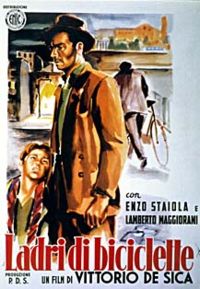
I just saw an old movie last night called The Bicycle Thief. It is an old foreign film, made in Italy in 1948. The story is about a guy who gets his bike stolen. Not the topic of a drama, you ask? Not so. It was a powerfully riveting and heart-wrenching film.
The story revolves around a man who is trying to support his family in Italy after WWII. He finally gets a job, but the job requires a bicycle. He and his wife sell the family bed sheets in order to buy their bicycle back from the pawnshop. Unfortunately, on the very first day of work, the bicycle is stolen by a group of thugs. The rest of the film takes place the next day as the man and his young son try desperately to find the bicycle.
The film is a work of "Italian Neorealism." From what I understand, no professional actors are employed. The main character, it seems, was actually a factory worker.
I believe everyone should see the film. After you see it, please come back and read the rest of the post...
I'll wait right here....
Seriously...
Seen it? Good. Now, what struck me most, I think, was the ending. The man, who has lost all hope, is tempted to steal a bicycle himself. And he does. He is chased down, caught, and humilitated in front of his son.
The movie is successful in making us resent intensely the person who originally stole the bicycle. We see the devastation that this one action caused in the lives of this poor family. But then, the film suddenly turns our judgment on its head. The father, who we feel great sympathy for, is then placed in the position of the thief. We want his theft to be successful. So, on the one hand, we are made to resent a thief intensly and then, just as quickly, we are made to completely sympathize with a thief. In this, it is a tale about our cautionary tale of our moral judgments, and how quick we are to point fingers without understanding.